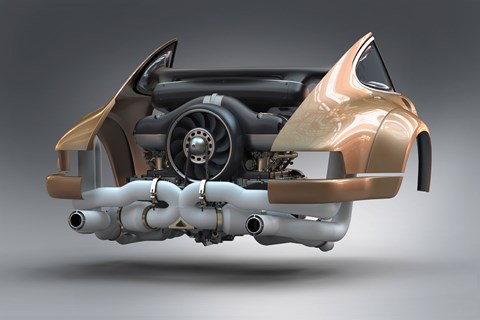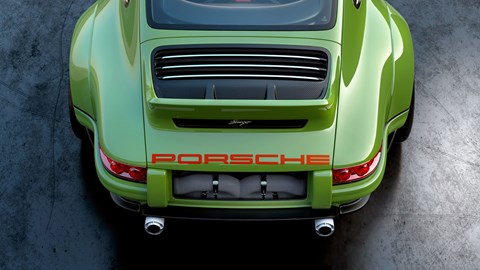► Porsche restorers enlist F1 expertise
► Expect even lighter, faster modified 911s
► Flat-six engine makes 493bhp without liquid-cooling
If you’ve an interest in older Porsche 911s you’ll be aware of the work of US obsessives Singer Vehicle Design. For some years the Californians have been taking in customers’ tired 964s and, over the course of some eight months and at a cost of more than half a million dollars, restoring and modifying the standard cars into pretty special machines that are the distilled essence of the air-cooled 911.
We last drove one in early 2016 and we’re yet to come down from the high.
Now Singer, founded by Englishman Rob Dickinson, has announced a couple of high-profile partnerships set to take its work to the next level.

Three clients have commissioned special cars with still more extreme power and weight targets, and to meet them Singer has enlisted the services of Williams Advanced Engineering (the consultancy arm of the Grand Prix group) and famed Porsche engine designer Hans Mezger, with further input from Michelin, BBS and Brembo. These cars will be modified at Williams’ Grove base in Oxfordshire, in a new department to be called ‘Singer at Grove.’
Williams Advanced Engineering has undertaken a ‘Dynamics and Lightweighting Study’ (DLS) on behalf of Singer, the results of which are being confidentially presented to Singer’s client base of around 75 customers.
First car to come out of the Singer/Williams collaboration is based on a 1990 Porsche 964 owned and commissioned by Porsche enthusiast Scott Blattner. Pictured in this article’s gallery, it’s finished in ‘Absinthe’ paint colour, with Blood Orange leather inside.
‘The results as applied to my car are extraordinary and we felt compelled to share with other enthusiasts exactly what this company is capable of when given the funds and the partners to excel at the highest level,’ said Blattner.
The ultimate air-cooled 911 engine?
This elite super-group have also been working on a 4.0-litre naturally-aspirated motor developing 500hp (493bhp) and revving beyond 9000rpm.

The unit, which starts out as a standard 1990 3.6, is worked over with four-valve heads, titanium con-rods, aluminium throttle bodies, carbon intake trumpets, a bespoke carbon airbox, fuel injection with twin injectors, a ram-air induction system fed by inlets at the rear side windows and a ludicrously lightweight exhaust system in Inconel and titanium.
Intricate aero and lightweighting measures
Subtle modifications are being made to Blattner’s 964’s underbody and surface bodywork to reduce drag and lift, as a result of CFD analysis by Williams and Norbert Singer – the engineer heavily involved in many of Porsche’s Le Mans-winning cars. Cosmic Motors designer Daniel Simon has also been an advisor on the styling front.
The suspension has been made lighter and more adjustable, with altered geometry and special dampers by competition specialists EXE-TC.

With magnesium, titanium and carbonfibre all making an appearance on the materials list, the minimum weight for Blattner’s car is expected to sit at 990kg. Even the gearbox, a lightweight six-speed by Hewland, features plenty of magnesium in its construction.
It wears bespoke Michelin Cup 2 tyres on 18-inch centre-lock forged magnesium wheels by BBS, around carbon composite brake discs by Brembo.
‘On a technical level, the study has been fascinating and has resulted in an incredible restoration with the benefit of top drawer resources and modern science,’ says company founder Rob Dickinson.
Singer restorations: no stone unturned
Even without the Williams input, Singer’s processes are thorough in the extreme. Bodyshells are reinforced and seam-welded before being fitted with exquisite carbonfibre panels; engine cover, bonnet and wings.
New glazing goes in, as do Singer’s own headlights and gorgeous nickel-plated detailing. The finished shape evokes both the ’70s RSR and ’60s 911R. Similarly, the infinitely customisable interiors reference 911s at least a decade older than the 964.
The money-no-object modification continues with Öhlins suspension, a new wiring loom, a hand-built motor with a six-figure dollar value, Brembo 911 Turbo brakes and a race-style bag fuel tank.

For a relatively young firm, Singer already has a rich history of highly-regarded collaborators, including Cosworth, who restored engines in the early years, and LA-based composite wizards Aria. The Williams partnership operates outside of Singer’s standard commissions, and will help satisfy its most hardcore customers.
‘This has been a fantastic opportunity to showcase the core capabilities of Williams Advanced Engineering,’ says technical director Paul McNamara. ‘Having had the opportunity to consult with Hans Mezger about the development of the engine, our team was pleased to able to provide a solution to Singer’s requirements and, of course, to be a part of this iconic vehicle’s continued evolution.’
The bulk of Singer’s engine work will remain with Ed Pink Racing Engines, with most clients going for the 4.0-litre unit: 390bhp at 7300rpm and 315lb ft at 5900rpm. The 4.0-litre motor in the new 911 GT3 makes 493bhp – the same output as the unit modified by Singer and Wiliams – but the GT3 motor is of course liquid-cooled.
Inside Singer: read CAR’s guided tour of the 911 fettlers’ LA HQ
